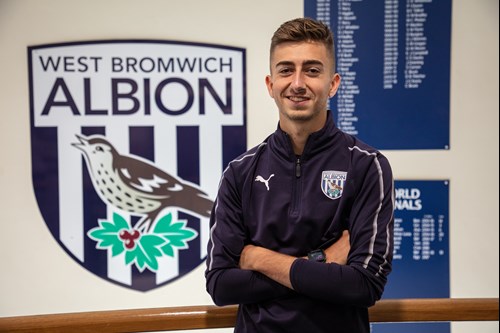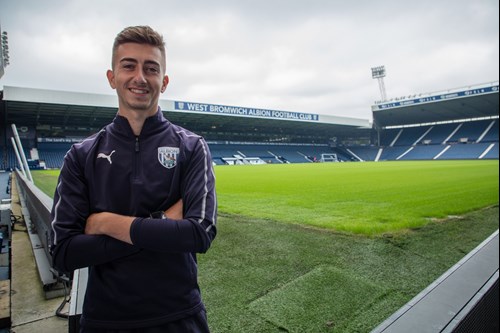After graduating from his BA (Hons) Sports Business & Coaching programme in 2018, Macauley Bishop landed a job with West Bromwich Albion’s community arm – The Albion Foundation – as a community coach. At the Championship club, he also acts as a Performance Analyst intern for the academy side and he recently secured a role as Performance Analyst at West Bromwich Albion Women. Here, Mac tells us about his job, what he’s learnt so far and what he’s taken from UCFB into the role…

How long have you been working for The Albion Foundation and what does your job entail?
I have worked for the foundation since August. After graduating from UCFB I completed my second summer coaching in America, and when I came back home I got the job with the foundation. The beauty of a job like this is that there are many different roles I take on every day. Some of these include working on a post 16 programme with a local college coaching the students, and working on lunchtime clubs with children at local schools. I also run afterschool clubs where I coach a range of different sports from football to dance. I also work on many evening centres which are more football-specific in order to develop players to the next level which are called player development academies. On top of all this, I also deliver PE lessons in local schools, and work with the foundation’s pre-academy which helps kids aged five to eight develop their skills.
What does a typical day look like for you?
I don’t really have a ‘typical day’ as every day poses a different challenge, which is what I love. The best thing for me about coaching is that no one day is the same. I do spend most of my time delivering sessions and developing young people which I find enjoyable.
With an organisation like the foundation, how important is networking and building contacts when working in the football and sports industry?
It’s incredibly important. In anything you do you can never know when you are going to see that person again later down the line, so you need to build good connections with everyone you meet. Furthermore, creating connections with schools and their staff can be vital for the foundation to build links and keep working with those schools. You can also look very close to home when networking as it’s not just external people you network with. For example, I work alongside around 40 other coaches, and together we have hundreds of years of coaching experience that can be tapped into and you can bounce ideas off about your sessions.
As well as working for the foundation, you also work as a performance analyst for WBA’s academy teams. How are you finding this role?
So I’ll tell you a bit about the role first to give it some context. At the weekends we are filming the games and live coding them against our academy DNA for the coaches to use with their teams in training. During the week we collect clips from either our own footage or platforms like Wyscout to enhance the depth of knowledge for the coaches and players around a topic. So far, I’m really enjoying this role. It’s something I started in my third year at UCFB when one of my lecturers managed to secure some of us a placement doing a similar role at Accrington Stanley. With this role I work six, sometimes seven, days a week but when you are getting paid to watch football I wouldn’t really call that a job! It’s really beneficial to see the differences in the academy setting compared to the community setting, and how these alter the delivery of coaching. I also feel it’s imperative to have another string to my bow if ever my career was to take a different path to coaching, and maybe this could be the road I go down one day? What I would say to any future analyst though is that you need to be prepared for some very cold Sunday mornings stood still on the touchline!

What skills have you been able to take into the workplace that you learnt during your time at UCFB?
The main skill I developed over my time at UCFB was my coaching ability. I am 100% a better coach now than I was when I first started, and this is for a number of reasons. During my third year, myself and another student coached the men’s third team to finish unbeaten as champions which was my first taste of coaching senior football, which posed new challenges for me as a coach. I also had the opportunity to visit the US twice to coach, an opportunity that came about due to UCFB’s links. There were also the countless sessions we had as a group coaching each other and practising new ideas.
I have also been able to take the business and leadership skills I learnt into my work. For example, in my third year, I was part of the Student Union and Athletic Union team heavily involved in the running of these two departments, where I learnt many skills that aren’t just about coaching on the grass. The modules on my degree programme also provided me with many skills I work on day to day, for example, the coaching in the community module helped me understand the importance of getting to know the backgrounds of the people you coach.

What advice can you give to prospective students thinking about studying a degree at UCFB?
One of the best things for me about UCFB is that it’s different to other institutions as it is all about sport. This is something which helped me massively as I am only really interested in sport, so if you have a passion for sport it’s definitely the place to be as you will meet like-minded people. I would also say that networking is a massive thing; so many times you hear stories in sport of ‘it’s who you know’ and that is so true, so get to know as many people as you can, whether that’s guest speakers, academics or fellow students. Finally, I would say make sure you enjoy it! That’s the main thing.
















